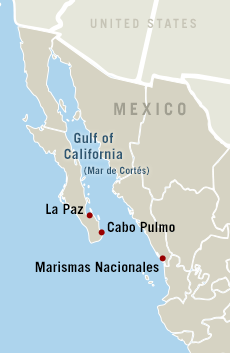OPINION
Groups applaud CEC for probing government role in seaside mega-resort schemes

(Photo: Courtesy of Earth Justice).
MONTREAL
Mexican and international environmental organizations are praising the decision of the Montreal-based Commission for Environmental Cooperation (CEC) to investigate the permitting of large-scale real-estate developments on the coast of the Gulf of California.
“By approving these projects, Mexico is failing its obligations to protect wetlands, coral reefs and species of environmental and international importance,” Natural Resources Defense Council America Advocate Carolina Herrera told the CEC.
The Gulf of California, or Sea of Cortez, dubbed the Aquarium of the World by late underwater explorer Jacques Cousteau, is a UNESCO World Heritage site. It is vital to the tourism and fishing industry and to protected species such as sea turtles that depend on its coral reef and shores for survival.
The CEC, based in Montreal, announced on Nov. 12, it would investigate charges against the government made in a citizen petition filed by the Natural Resources Defense Council, the Interamerican Association for Environmental Defense (AIDA), the Centro Mexicano para la Defensa del Medio Ambiente, the Red Ecologista por el Desarrollo de Escuinapa, Amigos para la Conservación de Cabo Pulmo, Wildcoast, la Sociedad de Historia Natural Niparajá, Greenpeace México, Los Cabos Coastkeeper, la Alianza para la Sustentabilidad del Noroeste Costero, and Sumar-Voces por la Naturaleza.
The commission called on Mexican President Enrique Pena Nieto’s administration to answer their complaints that the Environment and Natural Resources Secretariat broke the law in granting approval of four coastal real-estate ventures in Northwest Mexico.
In question are the adjacent mega-resort proposals of Entre Mares and Paraiso del Mar in La Paz, capital of Baja California Sur, as well as the Cabo Cortés development just to the south on the gulf’s largest coral reef of Cabo Pulmo, and the Costa del Pacifico project renamed Playa Espiritu, which is located in the nation’s largest wetlands near Mazatlan, Sinaloa.
The Baja California Sur proposals were cancelled following intense pressure on the administration of former President Felipe Calderon, and the Sinaloa project failed to become his flagship tourism feat when local residents visiting wetlands experts insisted on revamping it.
Petitioners assert that the developments would significantly impact the Bay of La Paz, the El Mogote mangrove spit and nesting area, and the Cabo Pulmo coral reef, as well as the Marismas Nacionales fishing resources in Sinaloa and Nayarit on the other side of the Gulf of California.
The plaintiffs’ case contends that Mexico is “failing to effectively enforce the Ramsar Convention and the provisions of Mexican environmental law applicable to environmental impact assessment, the protection of wetlands, and the conservation of endangered species.”
The Ramsar convention, also known as the U.N. Convention on Wetlands of International Importance, is a treaty named after the Iranian city where Mexico’s delegation was among those that signed it in 1971.
Mexico has 139 sites and 8,833,094 hectares of wetlands “of importance” listed under the Ramsar Convention.
Sandra Moguel, legal adviser to AIDA, called the CEC’S action an important advance in applying international and national law.
